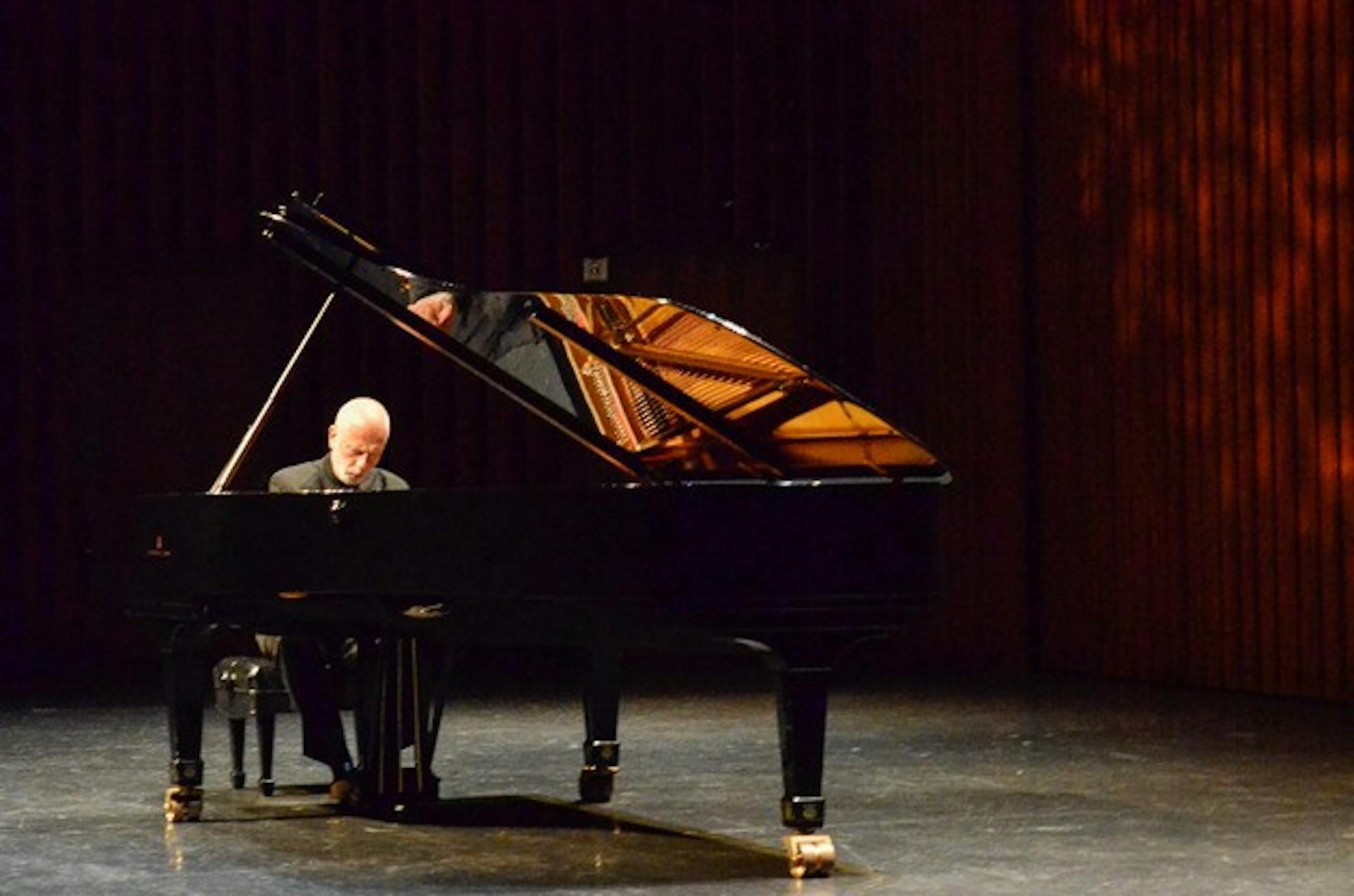Vladimir Feltsman's hands, reflected in the mirrored surface of a grand piano, seemed barely capable of keeping up with his real ones during his exuberant performance Friday night.
The recital by Feltsman, a Moscow-born pianist, was the last in a handful of major events planned for the slow summer season at the Hopkins Center.
With works by Haydn, Schubert, Liszt and Scriabin, Feltsman's program was enjoyable for the inexperienced listener as well as the classical music buff.
In a post-performance question and answer session, Feltsman explained the logic of his program, describing how the composers represent a progression of musical influence spanning almost two centuries.
"He's not one of those Russian players who just plays Russian music," said Richard Fu '13, the Hopkins Center's classical music student relations advisor.
The performance in Spaulding Auditorium was peppered with gray heads and a smattering of visiting students and sophomores. No one clapped between movements, and Feltsman made a point to thank the audience for its good behavior.
"You guys are an incredibly attentive and quiet people, which is not the case in the U.S.," he said, eliciting laughter.
Fu said the pianist's reserved manner lent itself to an honest, uncontroversial interpretation of the music that felt "effortless."
"I really liked that he played without pretensions and affectations, that the music seemed to speak very naturally through him," Fu said.
Feltsman opened with Haydn's Sonata No. 31 in A-flat major. It was a precise, sparkling melody not quite reaching the emotional highs and lows of the Schubert sonata that followed, albeit lyrical and technically impressive.
"I feel in a way he's old school, a no-nonsense player which goes with my impression that he doesn't do a lot of dramatic and attention-catching gestures," Fu said.
The Schubert piece may have sounded familiar to audiences, as it significantly influenced his later work. Cut-off musical phrases and moments of complete silence added to the piece's sense of drama and kept the audience rapt.
The second act of the concert began with low, ominous chords, signaling the program's movement into the early Modernist territory of Liszt. The first piece, "Ballad No. 2 in B Minor," tells the story of a woman protesting her husband's fate as a soldier in the Seven Years' War, until Death carries her away to join him in the grave.
The second work by Liszt, "Benediction de Dieu dans la solitude," was a clear audience favorite.
"I thought his control of the keyboard was especially masterful in that piece in the way he got so many shades of colors and tones, and the way he varied the depth of sound was really impressive," Fu said, praising Feltsman's interpretation.
The final piece, by Scriabin, was written to evoke the feeling of a fiery apocalypse.
"Scriabin is bizarre," Feltsman said during the question and answer session. "It's genius, but very strange work a mystery almost of self-sacrifice to the fire."
As the final notes in the piece faded, the audience rose to its feet for a standing ovation, recalling Feltsman to the stage for an encore. He performed another work by Liszt.
Feltsman trained in the Moscow Conservatory at a time when the institution contained the most important musical program in the world.
But when Felstman tried to emigrate from the Soviet Union in the late 1970s due to concerns over artistic freedom, the regime denied him a visa and effectively shut down his musical career. Eight years later, Feltsman obtained permission to leave. After arriving in America, he was invited to give his first recital at the White House and performed in Carnegie Hall later that year.
Feltsman went on to accrue international fame, working with almost all the "hotshots" on the contemporary music scene, Fu said.
Music major Andrew McKee '15 said he admired the pianist's virtuosity and professionalism.
"I think it would be amazing to be in his brain and have that musical knowledge," he said.
Margo Manocherian '15, who grew up going to concerts in New York City with her family, said she enjoys the Hop's classical music programming.
"It's a way to stay sane in Hanover," she said. "Without stuff like this, we would be in a cultural wasteland."
When questioned by an audience member about whether he believed that any post-19th century classical music was worthwhile, Feltsman cited influential composers including Shostakovich, Prokofiev and Stravinsky.
Felstman closed by expressing optimism about classical music's future.
"Hopefully there will be plenty of good music in this century," he said.




